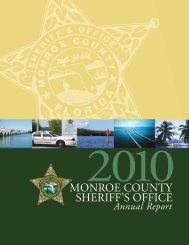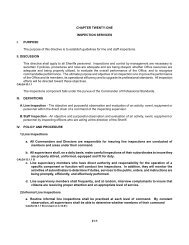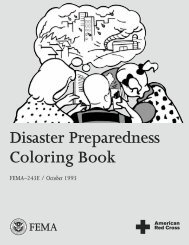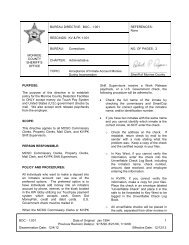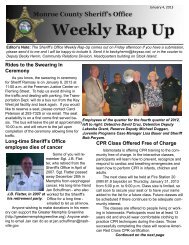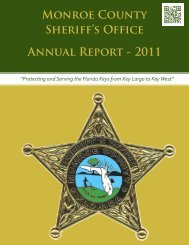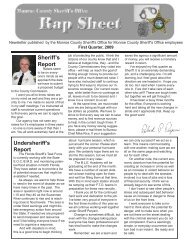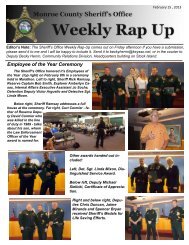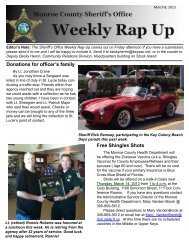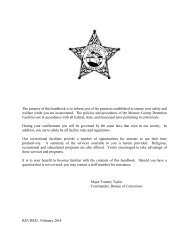Annual Report, Year 2006 - Monroe County Sheriff's Office
Annual Report, Year 2006 - Monroe County Sheriff's Office
Annual Report, Year 2006 - Monroe County Sheriff's Office
Create successful ePaper yourself
Turn your PDF publications into a flip-book with our unique Google optimized e-Paper software.
<strong>Monroe</strong> <strong>County</strong> Sheriff’s <strong>Office</strong> <strong>Annual</strong> <strong>Report</strong> - <strong>2006</strong><br />
The difference in a hostage and non-hostage incident is subtle but important. A hostage is held for some<br />
substantive gain by the taker. A non-hostage incident involves a person who is being held and their status is<br />
that of a victim as may occur in a domestic dispute, burglary, or robbery.<br />
A member of the Unit must receive special training in crisis intervention, negotiation techniques, recognition<br />
of patterns and clusters of behaviors and advanced active communication skills. These skills are used with<br />
the goal of a safer more controlled resolution to a volatile incident which poses high risk to the members of the<br />
Sheriff’s <strong>Office</strong>, persons in crisis and general public at large.<br />
The Unit responds with a minimum of two trained negotiators and at least one other member assigned<br />
for additional documentation. Members of the Unit actively maintain their skills and knowledge with additional<br />
training with the Federal Bureau of Investigation, which offers guidance as needed and with the Florida Association<br />
of Hostage Negotiators.<br />
<strong>Monroe</strong> <strong>County</strong> is in Region Six of the State of Florida, as outlined by the Florida Association of Hostage<br />
Negotiators (FAHN). FAHN Members train quarterly with SWAT and the Bomb Disposal Unit in scenario situations<br />
and spend an occasional training day at the range.<br />
The response begins with the gathering of information to build a database on the subjects involved and the<br />
current situation. Intelligence is critical to access all the possible factors and driving forces having an impact on<br />
the individual and/or the group dynamics. The situation must be contained with an outer and inner perimeter.<br />
Communications and access to the hostage taker and hostages must be limited and carefully controlled. Slowing<br />
down and controlling the situation allows the team to have influence and thus lead the subject to a peaceful<br />
resolution: the ultimate goal of hostage negotiation.<br />
Intelligence is gathered by various methods and is shared with SWAT to improve the overall response and<br />
resolution. The final phase of a negotiators task is to be the liaison between the subject and SWAT so there are<br />
no surprises for anyone as he or she surrenders and is taken into custody.<br />
The <strong>Monroe</strong> <strong>County</strong> Crisis Negotiation Unit currently has five negotiators in the Keys including one bilingual<br />
member (Spanish) and one female member: Team Leader Detective Don Dalton, Deputy Luis Blasco,<br />
Deputy Lee Cowart, Lt. Tom Brazil, Sgt. Bobby Randolph, Reserve <strong>Office</strong>r David Stark, and Reserve <strong>Office</strong>r<br />
Anngee Quinones. They are available day or night, at any time. Most of these members have over twenty<br />
years experience as Law Enforcement <strong>Office</strong>rs and offer that experience for the safety of the community and<br />
fellow members of the <strong>Monroe</strong> <strong>County</strong> Sheriff’s <strong>Office</strong>.<br />
Bomb Squad<br />
The Sheriff’s <strong>Office</strong> Bomb Squad is the only fully equipped<br />
explosives handling team in the Florida Keys. The Squad is made up<br />
of two certified bomb technicians, Detective Sgt. Bobby Randolph and<br />
Deputy Butch Albury, and Detective Jason Madnick, who is not yet<br />
certified as a bomb technician. Bomb Squad members respond to any<br />
calls involving found explosives, bomb threats, or suspicious packages.<br />
All members of the Squad also hold other working positions in<br />
the Sheriff’s <strong>Office</strong> and do not receive additional compensation for<br />
their presence on the Squad.<br />
New Bomb Squad truck, acquired in <strong>2006</strong> with Homeland<br />
Security funds.<br />
The Bomb Squad also handles the destruction of explosive<br />
devices, old<br />
outdated ammunition,<br />
flares, and other dangerous items. Citizens<br />
who have such items to dispose of should contact<br />
Sgt. Bobby Randolph at 305-292-7060 to discuss safe<br />
handling and disposal.<br />
The Sheriff’s <strong>Office</strong> Bomb Squad has state of the<br />
art equipment to handle dangerous situations and has,<br />
in the past, been called upon to dismantle home made<br />
explosive devices, destroy old dynamite, clear buildings<br />
of dangerous explosives, and search buildings,<br />
boats, and other locations for possible explosives. This<br />
year the Bomb Squad has sent new Bomb Tech Jason<br />
Madnick to the F. B. I. Bomb School for six weeks, and<br />
42<br />
The Sheriff’s Bomb Squad at a training<br />
session.




